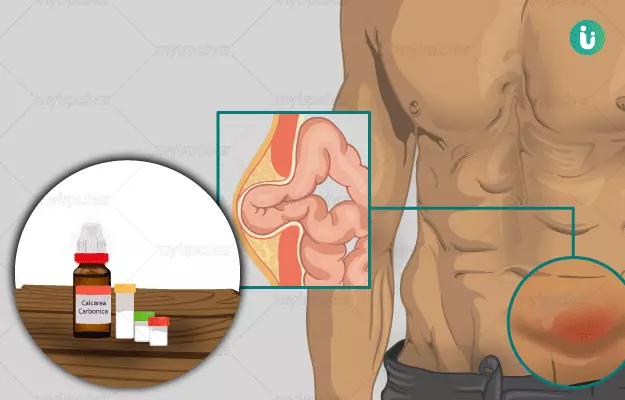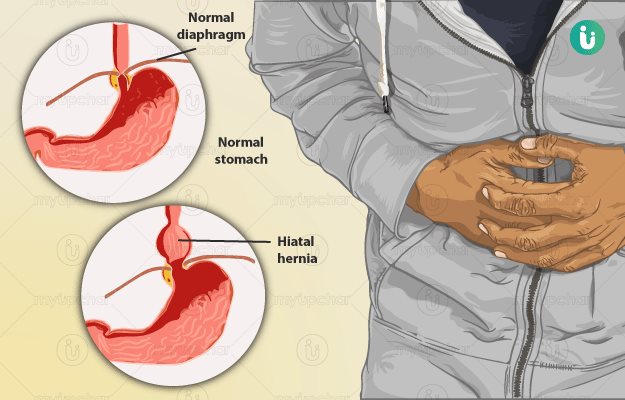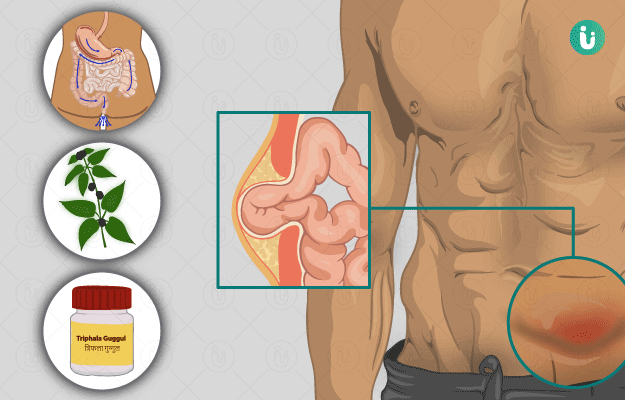Hernia is a medical condition wherein an organ or tissue protrudes through a weak section of the body. These weak muscle areas could be present since birth or may appear later in life.
Hernias affect indivudals of all ages and are seen in men and women alike. Most commonly, hernias are noted in the abdominal wall. However, depending on the tissue and organ involved, hernia could be of different types. This includes:
- Inguinal hernia: Occurs in groin
- Umbilical hernia: Occurs in the naval area.
- Incisional hernia: Occurs through a scarred tissue
- Hiatal hernia: It is present in a small opening in the diaphragm.
- Obstructed or incarcerated hernia: Marked by obstruction in the colon (large bowel)is obstructed
- Strangulated hernia: Results in blocking of blood supply to intestinal tissue which can cause serious complications.
Most commonly hernia appears in the form of a localised lump or swelling, which may change in size while lying down or coughing. Due to the protrusion of an organ, the individual may also experience a heavy and uncomfortable feeling while bending or lifting things. Hernia can also lead to other symptoms such as constipation and pain.
Hernia is usually diagnosed with the help of a physical exam followed by imaging tests to confirm the diagnosis.
Surgery is the best way to treat hernia completely. However, the use of homeopathic medicines such as Nux Vomica, Opium, Tabacum, and others have also proven to be effective in the management of hernia symptoms.
- Homeopathic medicines for hernia
- Dietary and lifestyle changes for hernia patient as per homeopathy
- How effective are homeopathic medicines and treatments for hernia
- Side effects and risks of homeopathic medicine and treatments for hernia
- Takeaway
Homeopathic medicines for hernia
- Aesculus Hippocastanum
Common name: Horse Chestnut
Symptoms: This remedy is best suited for treating inguinal hernia. The following symptoms can be improved with the help of this remedy:- Heavy feeling in the stomach
- Heartburn
- Sore throat
- Stomach pain
- Tenderness over the liver region
- Pain after passing stools
- Frequent urination
- Constriction in chest
- Irritation in rectal area
- Silicea
Common name: Silica
Symptoms: The following symptoms are relieved with the use of silicea: - Nux Vomica
Common name: Poison Nut
Symptoms: Nux Vomica is used for treating different kinds of hernias. It not only works for adults but is also useful for treating an umbilical hernia in infants. This remedy is administered to individuals who display the following symptoms:- Prolonged constipation, which has led to weakening of abdominal muscles and resulted in a hernia
- Frequently passing stools with much difficulty, which makes the person feel sore in the abdominal area
- Itching in anus area, which produces discomfort and constant uneasiness
- Waking up with a sour taste in mouth accompanied by a feeling of nausea or feeling nauseated immediately after eating
- A tendency to feel cold along with low tolerance to lower temperatures
- Craving for strong stimulating items such as alcohol or strong coffee multiple times throughout the day
- Calcarea Carbonica
Common name: Carbonate of lime
Symptoms: This medication works well for the treatment of hernia in children who sweat excessively on the head. However, it must not be administered too frequently to elderly people. Calcarea Carbonica is often the preferred homeopathic medication in individuals who experience the following symptoms:- Weakness in abdominal muscles due to obesity, which an individual to develop hernia. Such people refrain from wearing tight and body-hugging clothes as these clothes only aggravate the discomfort
- A persistent sour taste in mouth and dryness in tongue during night time
- Bad breath, which does not go away even after maintaining proper oral hygiene
- Craving for indigestible things such as chalk, or even coal or a craving for cold drinks, especially while eating
- Abdominal tenderness
- Flatulence
- Passing large and hard stools and dark coloured urine
- Rhus Toxicodendron
Common name: Poison Ivy
Symptoms: This medication is often prescribed to individuals who develop a hernia due to lifting heavy objects. Poison ivy works best in patients who display the following symptoms:- Excessive thirst due to dryness in mouth and throat
- A perisitant bitter taste in mouth
- Feeling bloated after meals.
- Small ulcers at the corners of mouth
- Fissured tongue that appears to be red
- A tendency to experience violent pain, which subsides by lying on the abdomen
- Swelling in inguinal glands
- Lycopodium Clavatum
Common name: Club moss
Symptoms: Patients requiring this medicine usually experience the following symptoms:- Excessive hunger
- Cravings for sweets
- Stomach pain and bloating after meals The person may also have hunger cravings in the middle of the night and prefer hot drinks
- A tendency for developing hernia on the right side
- Presence of brown spots on abdomen
- Episodes of shooting pain across lower abdomen that radiates from right to left
- Hard and small stools, which are difficult to pass
- Numbing of hands and feet
- Opium
Common name: Poppy
Symptoms: Poppy is usually administered for the treatment of obstructed hernia. This medication is provided to individuals who display the following symptoms:- Dryness of throat and mouth
- Discolouration and ulceration of tongue
- Loss of appetite and violent thirst
- A weak digestive system, which leads to slower digestion of food
- Nausea along with vomiting of blood or faecal matter
- Feeling a vague heaviness and pressure in stomach, which causes pain and discomfort
- Rumbling in stomach with pressing pain in the abdominal area
- Constipation due to slow activity of intestines
- Chest pain and nightmares
- Tabacum
Common name: Tobacco
Symptoms: Tabacum is used for treating incarcerated hernia, which is usually accompanied by severe pain. This remedy is well suited for individuals who experience the following symptoms:- Sadness, restlessness, and difficulty in concentrating on one thing at a time
- Frequent headaches accompanied by confusion and vertigo
- Frequent sneezing and dryness in nose
- Frequent stomach aches along with a burning sensation in the stomach
- Constipation
- Thuja Occidentalis
Common name: Arbor Vitae
Symptoms: This remedy is suitable for individuals with the following symptoms:- Loss of appetite
- Pain in stomach
- Excessive thirst
- Flatulence
- Pain after eating food
- Chronic diarrhoea, especially in the morning
- Constipation
- Rectal pain
- Anal fissures
- Pain in the tip of the tongue
- Sensitive gums
A case study of an individual with inguinal hernia in the left scrotum for 2 months indicated that Thuja successfully resolved this condition without showing any side effects. No recurrence of hernia was reported post-treatment.
- Plumbum Metallicum
Common name: Lead
Symptoms: This remedy is recommended for treating strangulated hernia. However, it is not suitable for children. Individuals requiring this remedy complain of:- A sore throat and feeling as if a ball is stuck in the throat
- Cravings for fried food items and violent thirst
- Feeling certain tightness in stomach with constant vomiting of bile or blood and difficulty in swallowing
- Soreness around naval area, sensation as if a string is pulling the abdominal wall towards the spine
- Chamomilla
Common name: German Chamomile
Symptoms: Chamomilla is an excellent remedy for treating umbilical hernia in children. This is well suited for individuals who report symptoms such as:- Intense pain in navel area
- Excessive irritability
- Toothache, which is triggered upon taking any food item which is too cold or hot
- In children, drowsiness or excessive weeping maybe noted. The child may report a constricting pain in throat, along with, ringing in ears
Dietary and lifestyle changes for hernia patient as per homeopathy
Do’s
- Homeopathic medicines must always be taken as per the advice of a registered homeopathic practitioner.
- Make sure you are having a healthy and nutritious diet.
- Include a healthy amount of physical activity in your daily routine.
- Personal hygiene and environmental hygiene must be maintained.
Don’ts
- Avoid consuming strong stimulants such as caffeine or alcohol.
- Avoid consuming strong-smelling food items right before or after taking the medicine Smoking must be avoided at all costs while on homeopathic medicines.
- Do not consume stimulating foods and herbs such as soups, garlic, ginger, and asafoetida.
- Spicy food and processed food must be avoided as they are usually high in sugar and salt.
How effective are homeopathic medicines and treatments for hernia
Homeopathic remedies help treat hernia naturally and are known to provide symptomatic relief to hernia patients. Extracted from plants and minerals, homeopathic medicines are prescribed in very minute and controlled doses, keeping in the mind the disease symptoms and individual miasms. Hence, homeopathy offers a much-individualised approach for treating hernia with minimal or no side effects. Homeopathic treatment of hernia aims at rooting out the underlying causes of this condition, so as to reduce one’s predisposition to this condition and prevent relapse.
Side effects and risks of homeopathic medicine and treatments for hernia
A correct homeopathic medication, when taken under the supervision of a doctor is entirely safe to use. However, each remedy is suited to indivudal miasms along with disease symptoms so it is best to avoid self-medication. Since a remedy that works well in a certain individual may as well worsen the condition for another, especially when taken in wrong dosage.
Takeaway
A hernia can be painful and uncomfortable to endure. Also, it cannot be left untreated for long. Once noticed and diagnosed, a holistic and timely treatment, using homeopathic remedies, can be helpful in managing hernia symptoms, as well as, eliminating the chance of future occurrences.
Find Homeopathic Doctor in cities
Doctors for Homeopathic medicine, treatment and remedies for Hernia

Dr. Rutvik Nakrani
Homeopathy
6 Years of Experience

Dr. Jyothi
Homeopathy
23 Years of Experience

Dr. Urvashi Chaudhary
Homeopathy
8 Years of Experience

Dr. Anita Kumari
Homeopathy
12 Years of Experience
References
- MedlinePlus Medical Encyclopedia: US National Library of Medicine; Hernia.
- Better health channel. Department of Health and Human Services [internet]. State government of Victoria; Hernias.
- National Center for Homeopathy Aesculus hippocastanum. Mount Laurel, New Jersey [Internet].
- James Tyler Kent B. Lectures on Homoeopathic Materia Medica. Jain Publishers, 1989. Robert Séror 2000
- National Center for Homeopathy Calcarea carbonica. Mount Laurel, New Jersey [Internet].
- William Boericke. Homeopathic Materia Medica. Kessinger Publishing: Médi-T 1999, Volume 1
- National Center for Homeopathy Opium. Mount Laurel, New Jersey [Internet].
- C Rathish,T Ajayan. A Case of Inguinal Hernia Cured with Homoeopathic RemedyThuja Occidentalis. Journal of Clinical Images and Case Reports 2018 2:1.
- National Center for Homeopathy Chamomilla. Mount Laurel, New Jersey [Internet].
- Samuel Hahnemann B. Organon of Medicine. Jain Publishers, 2002 - Medical - 6Th Edition. MEDI-T 1998
















